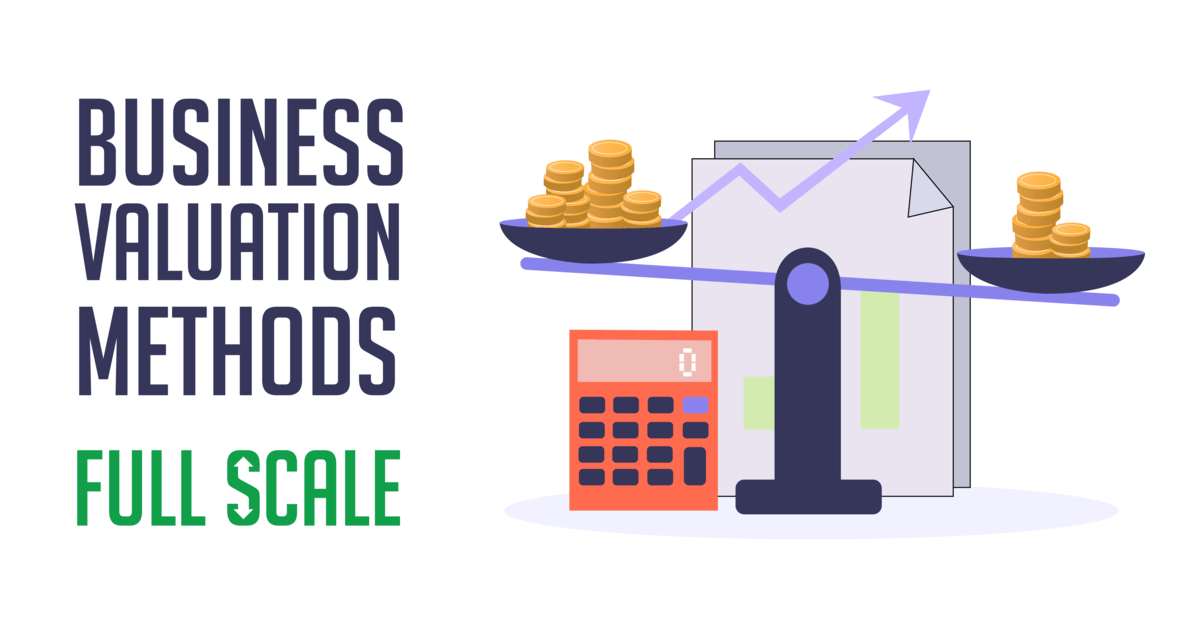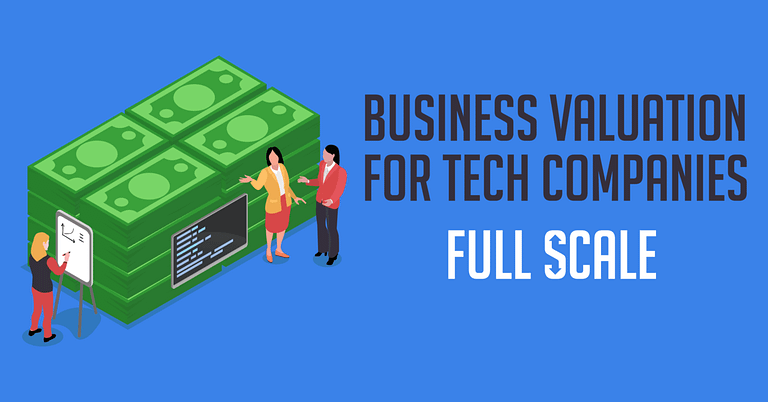Growing a business is an exciting and challenging endeavor, and one of the first things many entrepreneurs think about is how to value their startup. There are several methods for valuing a startup, and the most appropriate method will depend on a variety of factors, including the stage of the company, the industry in which it operates, and the availability of data.
If you’re a business owner planning to sell your business in the future or simply want to track your current growth as a business, then a business valuation will come in handy. In this entry, we’ll discuss what factors affect a business’ market value. We’ll tackle the concept of business valuation, its methods, and how a company can increase its value.
Tech Companies: How Are They Valued?
The tech boom has been the largest wealth-creator in history, now making up 35% of the global market. It’s an intensely competitive field in which the hot companies attract investment at many times the multiple more traditional businesses could ever expect. Tech companies’ ability to scale exponentially makes VCs eye high-potential startups with a voracious appetite.
That being said, after several tech bubbles and high-profile cases of mismanagement or outright fraud (FTX, Theranos, and WeWork come to mind), not to mention a tightening global economy, investors have become far more cautious in the past year.
What Is Business Valuation?
A business valuation determines the economic value of a business, either in full or in part. Knowing the company’s worth offers the business owner a wealth of data and statistics. The worth is measurable through market competition, asset values, and income.
Business valuations are used in a variety of situations, such as establishing partner ownership, evaluating the sale price of a business, evaluating tax considerations, or supplementing divorce processes.
Financial analysts can employ a variety of startup valuation techniques. We’ll go over a few well-liked techniques for appraising companies below.
Why Get A Business Valuation for Your Startup?
Here are the reasons why business valuation is a must for businesses.
To Attract Investors
A business valuation for a tech startup can be used to attract potential investors. Valuations provide the basis for making sound decisions in regard to the company’s worth and future potential. A well-prepared business valuation allows startups to prove their worth, thus making it easier for them to secure funding.
To Benchmark Progress
Business valuations can help a tech startup measure how much value they’re adding from quarter-to-quarter or year-to-year, as well as allowing them to make more informed decisions about expansion and other investments. The data gathered from the valuation can also be used by founders to compare their progress against that of other similar businesses, helping identify areas in which they may need greater focus or improvement in order to maximize potential growth.
To Set Long Term Goals
By obtaining a professional opinion on the overall financial performance of their business, Founders and decision makers within a Tech Startup have a better understanding of what is achievable over time, informing strategic planning and goals setting processes. This process can help clarify objectives and also offer guidance on when certain milestones should be achieved and how they should be delivered operationally, financially, and marketing-wise.
To Gain Confidence
When dealing with raised capital or selling shares, Founders will want to gain confidence not only from themselves but from investors as well that what they are proposing is realistic & achievable whilst achieving expected returns for the investor from now on within agreed projected timescales and exit points if required. Valuations can provide this clarity & transparency, offering assurance that founders are making informed, rational decisions backed up by robust evidence & market analysis/experience, especially at an early stage when there might be less available data available than would normally inform traditional pricing processes/models in later stages of mature companies.
To Negotiate Deals
A business valuation provides benchmarks upon which important deals can be negotiated – whether it’s seeking further investment or merging with another company. Having an accurate assessment of your company’s worth can make negotiating prices quicker while ensuring you get fair compensation upfront. It also prepares tech startups for any unexpected changes in their industry – such as changing regulations or a shift in customer demand – while minimizing risk during negotiations with partners or lenders.
Business Valuation Methods

Some of the most common methods for valuing a tech startup are:
- Comparable Transactions Analysis: This method looks at a tech startup’s comparable companies and their recent transactions, such as mergers & acquisitions or private placements, to estimate an appropriate valuation figure.
- Asset-Based Valuation: This involves estimating the fair market value of the assets/liabilities owned by a tech startup in order to determine its overall value.
- Option Pricing Model: This is particularly useful for early-stage startups when there is little financial data available. The model works by pricing options like those used in start-up capital-raising rounds to make an estimate of total corporate value.
- Return on Investment (ROI) Approach: This uses the internal rate of return methodologies to calculate how much potential investors can expect to receive from their investments in the tech startup, allowing them to come up with an estimated worth for a particular time period (e.g., 1 year).
- Discounted Cash Flow (DCF): This method takes into account the expected cash flows of the company and discounts them to present value to calculate the company’s worth.
We’ve discussed valuation methods in more detail in a previous post about startup valuation.
Increasing Your Business Value
1. Demonstrate traction and market growth
Investors want to put their money into businesses that are right at the beginning of a hockey stick growth curve. Companies like Facebook achieved monumental valuations before having a clear revenue model because their user growth was so impressive. Uber and others continued to improve their valuations despite racking up massive losses year after year.
2. Increase your profits
Find ways to increase your profit margin by implementing new business strategies. Look for methods you can apply to your current sales model and try them out. Likewise, evaluate the processes that aren’t working or yielding any returns.
One of the most common strategies is to diversify and grow your customer base. Furthermore, you can also look at ways how to keep more of the money you’re making. Study your processes and look for ways to increase operational efficiency, cut costs, and control inventory without compromising your operations. There may be new methods that can streamline the operational processes that can help you reduce business expenses.
3. Strengthen your marketing efforts
One important strategy to increase your company’s value is to invest in marketing and branding. Make sure your message showcases the uniqueness of your brand. In this modern market, digital marketing is one of the most-used strategies for tech brands. Advertising online drastically expands your market reach and builds up your presence.
To get started, you can look at what marketing campaigns your competitors are doing. Do a competitive analysis so you can gain more insights from their practices. Furthermore, you can also study the most recent marketing trends for businesses. Here are a few more tips on how to market your startup in 2022.
4. Strategize
A formal plan that presents measurable goals and milestones for the coming years will give your business more credibility. Looking at things from a long-term perspective will help you determine which aspects to prioritize at present.
You can avoid the common pitfalls of businesses by creating a detailed business plan. This will give a comprehensive overview of your strengths and weaknesses. It will also help you navigate and pivot in a dynamic industry.
5. Seek advice
Lastly, you can never go wrong in asking for help from the right people. Having an experienced advisor will help you prepare your business for sale, and they can help you conduct your business valuation. Professional advice will ensure you’re not missing crucial points while ticking off crucial items on your checklist.
Scale Your Operations With Full Scale
Your business value increases dramatically when you can show a track record of growth, stability, and success. Having a great team will ensure that your current and future operations run smoothly. That’s why you should build on the foundation of finding competent talent.
Full Scale has been helping businesses scale their operations for years. We’ve worked with companies of all stages, from startup MVPs to established enterprise software companies. Our goal is to help business owners execute their plans and vision for their companies. We bring fast-growing tech companies the flexibility to scale their development teams quickly and affordably.
If you’re looking for awesome talent, Full Scale can help! We’ll assemble a dedicated team of seasoned experts for all your business needs.



